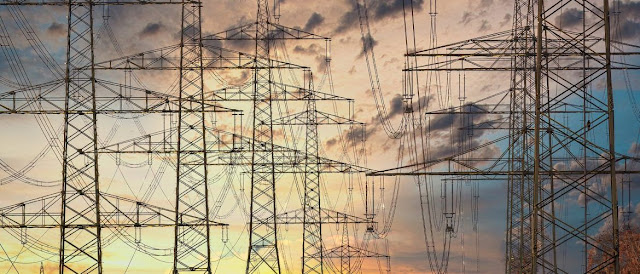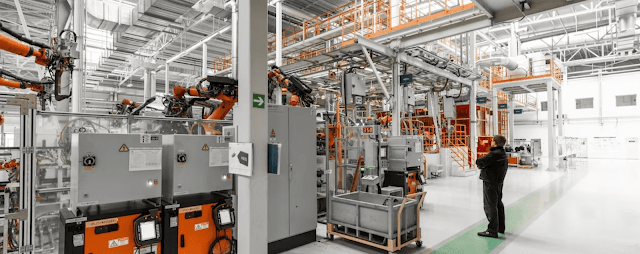The importance of electrical systems in industrial plants
The electrical system in an industrial plant has an important and necessary role to ensure the stable and efficient operation of the entire production process. Here are some important factors about the importance of electrical systems in industrial plants:
Power supplyThe electrical system ensures the supply of electrical energy to other equipment, machines, and systems in the plant. Electrical energy is the main source of power to operate production machinery, lighting systems, refrigeration systems, and automatic control systems.
Stable and reliable
The power system needs to ensure that the power supply is continuous and stable for the entire plant. Outages or failures in the electrical system can cause disruptions in the production process, disrupt workflows, and cause economic losses. A reliable electrical system is needed to avoid these negative effects.
Safety
Electrical systems in a plant should be designed and operated safely to prevent electrical accidents, such as electric shock, fire, or other incidents that could cause injury to personnel and equipment. Ensuring compliance with electrical safety regulations and using the right protective equipment is critical to ensuring safety in the work environment.
Control and automation
Electrical systems play an important role in controlling and automating production processes. It helps to regulate and control other machines, equipment, and systems to ensure stable operation and maximum performance.
Energy saving and efficiency
Smart and efficient electrical systems save energy and increase efficiency in the factory. Using advanced technologies such as energy management systems, efficient LEDs, inverters, and energy regeneration systems can reduce electricity consumption and increase the sustainability of industrial operations.
In summary, the electrical system in an industrial plant plays an important role in providing continuous, stable, and safe energy for the production process. It also plays an important role in controlling, automating, and increasing factory efficiency.
Determine energy requirements in the plant
Determining power requirements in a plant is an important process to ensure the electrical system is designed and delivers the right amount of energy. Here are some factors to consider in determining energy requirements in a plant:
Total capacityDetermine the total required capacity of the equipment, machines, and systems in the plant. This includes calculating the power consumption of production machines, lighting systems, cooling systems, ventilation systems, water systems, and other electrical equipment.
Energy consumption analysis
Assess energy usage in the plant by analyzing and recording energy consumption indicators. Tracking the daily, weekly, and monthly energy consumption of production systems and processes helps to identify areas of high energy consumption and find energy savings opportunities.
Maximum load and load
Determine the maximum and expected load in the plant. The maximum load is the power required at the highest point in the production process. Load is the extra power consumed when there is ancillary equipment or a special production process.
Expansion Forecasting
Assess future plant expansion plans and determine future energy requirements based on new technologies, new production lines, or expanded processes.
Energy Efficiency
Assess the energy performance of existing equipment and systems. Improving energy efficiency can reduce energy consumption and help optimize plant operations.
Regulations and standards
Reviews regulations and standards related to energy consumption in the industry to ensure compliance and meet sustainable energy requirements.
Based on the above factors, the plant can determine energy requirements and develop an appropriate power supply plan to ensure stable and efficient operation of the power system.
Load analysis in the factory
Plant load analysis is the process of identifying and evaluating the different levels of electrical loads that a plant's electrical system needs to service. Load analysis provides important information about energy consumption and load on the power system, helping in the management and optimization of system performance. Here are some important aspects of in-plant load analysis:
Measurement and data recording
First, it is necessary to measure and record data on the electricity consumption of equipment, machines, systems, and other areas of the plant. This can be done using energy measuring devices or energy monitoring systems to collect information on electricity consumption and other relevant parameters.
Data analysis
After data collection, these metrics need to be analyzed to better understand energy consumption patterns in the plant. Data analytics helps identify consumption patterns, identify peaks, and time-dependent loads, and identify trends and fluctuations in energy consumption.
Determine the maximum load
Load analysis helps to determine the maximum load of the electrical system, i.e. the highest electrical load the system must meet. Determine the maximum load required to ensure that the electrical system is designed and provides enough capacity to meet peak plant demand.
Predictive and Predictive Calculations
Load analysis also enables predictive and predictive calculations of the future load of the power system. Based on current data and factors such as expansion plans, variations in production, and weather factors, load forecasting helps the plant budget for the energy needed and ensures that the electrical system capable of meeting future needs.
Load management and optimization
Based on information from load analysis, plants can optimize load management to ensure efficient use of energy. Measures such as employee training, electrical contract management, scheduling production, and leveraging information technology to optimize loads and minimize energy waste.
Factory load analysis is an ongoing and important work in energy management. It helps the plant better understand energy consumption, predict and manage loads to ensure stable and efficient operation of the power system.
Conclusion
Analysis and design of electrical systems in industrial plants is an important factor and cannot be ignored. Electrical system analysis and design in an industrial plant play an important role in ensuring the stable, safe, and efficient operation of the plant. It provides a solid basis for production and helps save energy, increase efficiency, and meet the needs of future plant expansion.
Watch more: MEP Engineer
Watch more: professional engineer in Houston
Watch more: licensed engineer in Houston
Watch more: mep engineering firms in Houston
Watch more: design engineer in Houston
Watch more: HVAC engineering firms in Houston
Watch more: electrical engineering firms in Houston
Watch more: plumbing engineering firms in Houston
Watch more: mechanical engineering firms in Houston


